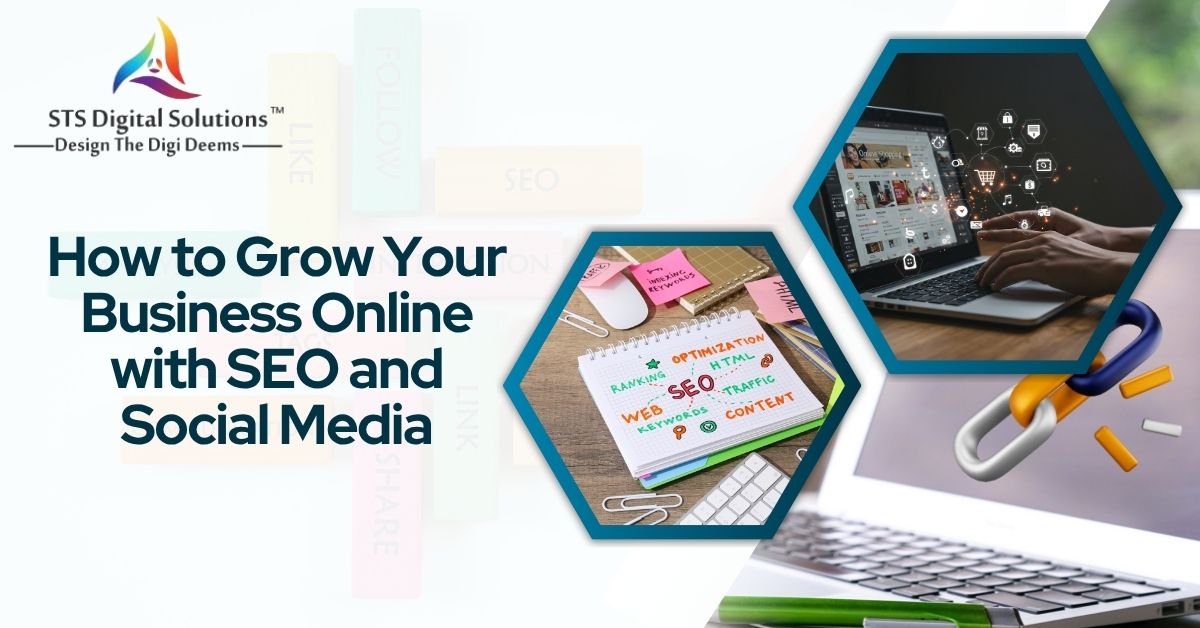How to Grow Your Business Online with SEO and Social Media

Today's competitive digital scenario requires a solid strategy supported by the two most powerful devices available to increase a business's online SEO and Social Medias. Both these forces, when aligned correctly, provide unmatched ability to create visibility, run target traffic, generate leads, and establish a permanent brand loyalty. Whether you are a startup or trying to score an established brand, understand how SEOs and social media work together, 2025 and beyond, it is important to dominate your niche.
Why SEO is Essential for Online Business Growth
Search Engine Optimization (SEO) is the foundation of online visibility. When your website is optimized for search engines such as Google, it appears systematically in search results when people seek products or services provided by you. To be displayed on the first page of Google is not only about clicks, it is about belief, authority, and relevance. In 2025, SEO is more important than ever before. Google's AI-powered algorithm rewards valuable, user-centric materials.
The SEO helps businesses attract traffic that converts. Unlike paid advertisements, which stop spending once, organic SEO efforts have a compound effect. A well-ranked blog post or landing page can bring new customers for years. Keyword targeting, on-page optimization, technical SEO, and link-building are some columns that help businesses strengthen their appearance. If done correctly, the SEO becomes a long-term growth engine that provides ROI continuously.
Understanding the Role of Social Media in Digital Success
While SEO creates your long-term visibility, social media enhances the voice of your brand and lets you connect to the audience in real time.
Platforms like Instagram, Facebook, LinkedIn, YouTube, and TikTok are not just entertainment outlets - they are not marketplaces where consumer is noticed. Businesses to take advantage of social media can increase awareness, promote trust, and users can push the sales funnel below more efficiently.
Social media marketing is never only about posting. This includes content planning, audience analysis, community engagement, impressive cooperation, and an advertising campaign that results in average. Social evidence, real-time engagement, and the power of user-related content come in all games. Additionally, social platforms provide advanced targeting options through paid advertisements, allowing you to access hyper-specific demographics aligned with your business goals.
How SEO and Social Media Work Together
While SEOs and social media may look like different channels, they are rapidly connected. Social signals such as shares, choices, and comments indirectly affect search visibility. When your content performs well on the social platform, it often earns backlinks from bloggers, journalists, and niche sites, which promotes your domain authority. On the other hand, the SEO-friendly blog content provides you with valuable assets to share in social channels, driving traffic to your website.
An effective strategy is to use social media to promote your high-performance SEO content. By pushing your blog, product page, or landing pages on platforms such as LinkedIn and Facebook, you increase access and increase the possibility of engagement. Similarly, social media insights can inform your keyword strategy by identifying trending subjects and audience interests.

Content as the Bridge Between SEO and Social Media
The content is located in the hearts of both SEO and social media marketing. It is glue that binds your website and platforms together in a harmonious strategy. For SEO, the content should be keyword-rich, well-structured, and written with the intentions of the user. For social media, the content should be visually attractive, shared, and emotionally echo.
To run development, focus on creating different types of content such as blogs, infographics, videos, podcasts, and carousels. A detailed blog post optimized for SEO can later be renovated into a size video snippet, social graphics, or reels. This not only maximizes your efforts but also ensures that your message reaches wide audiences in various forms.
Targeting the Right Audience with the Right Message
Another major advantage of the combination of SEO and social media is the ability to target your ideal audience with laser precision. The SEO allows you to attract those who have already searched for what you offer. These users are highly anticipated and more likely to change. On the other hand, social media allows for interest-based targeting and remarketing. By using both, you attract new possibilities and reconnect with existing followers.
When your message is aligned in both channels, you create an integrated brand experience. For example, if your SEO content targets the "inexpensive marketing tool for startups", your social content should be strengthened with the admissibility, recent video, or founder insight. This multi-touch strategy creates familiarity and trust over time.
Paid Strategies That Combine Both Worlds
To accelerate development or growth, many businesses are now investing in paid campaigns that mix SEO and social media insights. For example, by running Facebook or Instagram advertisements that promote your most SEO-friendly blog posts, your organic ranking can be increased by increasing time and engagement. In contrast, Google Ads data can reveal high-performing keywords that you can use in your social copy or hashtag.
The real trick is data sharing. By analyzing the metrics in both SEO tools (such as Google Analytics and Search Console) and social media dashboard (such as Meta Business Suite), you get a clear picture of what you are doing. This allows for tight decision-making and real-time campaign adjustment.
Measuring Success and ROI from SEO and Social Media
It is important to measure success. For SEO, major performance indicators include keyword ranking, organic traffic, bounce rate, time, and backlink development on the site. For social media, you want to track engagement, access, follower growth, and conversions. However, the most important metric is ROI - how much return you are getting on time and invested money.
Attribution is the major challenge, but modern equipment allows for multi-channel tracking. Platforms such as Hubspot, SEMrush, and Google Analytics 4 provide sophisticated attribution models to track customer journeys. By tagging the campaigns correctly and establishing conversion goals, you can understand which touchpoints lead to final sales or inquiries.

Future-Proofing Your Digital Strategy
The digital landscape is developing rapidly. AI, voice search, short-form videos, and zero-click content are being shaped again in how people search and interact with brands. To constantly develop your business, you must stay updated on trends, adapt quickly, and embrace experimentation. SEOs and social media are not stable - they require constant attention and refinement.
Constant learning and investing in data-making adjustments will not only help your business but also grow. Whether it is especially optimization for snippets, using those affecting, or building the community through newspapers and groups, there is a next level to reach out forever.
Conclusion
Increasing your business online through SEO and Social Medias is not just a strategy; this is a mindset. It is about showing where your audience is, speaking their language, and providing consistent values.
When combined strategically, SEO and social media form a powerhouse that fuels sustainable growth, brand awareness, and high-intent conversions. For businesses looking to scale in 2025, this combination is no longer an option; it’s essential. To implement these strategies with precision and impact, consider partnering with a trusted digital marketing agency like STS Digital Solutions, where innovation meets measurable results.


